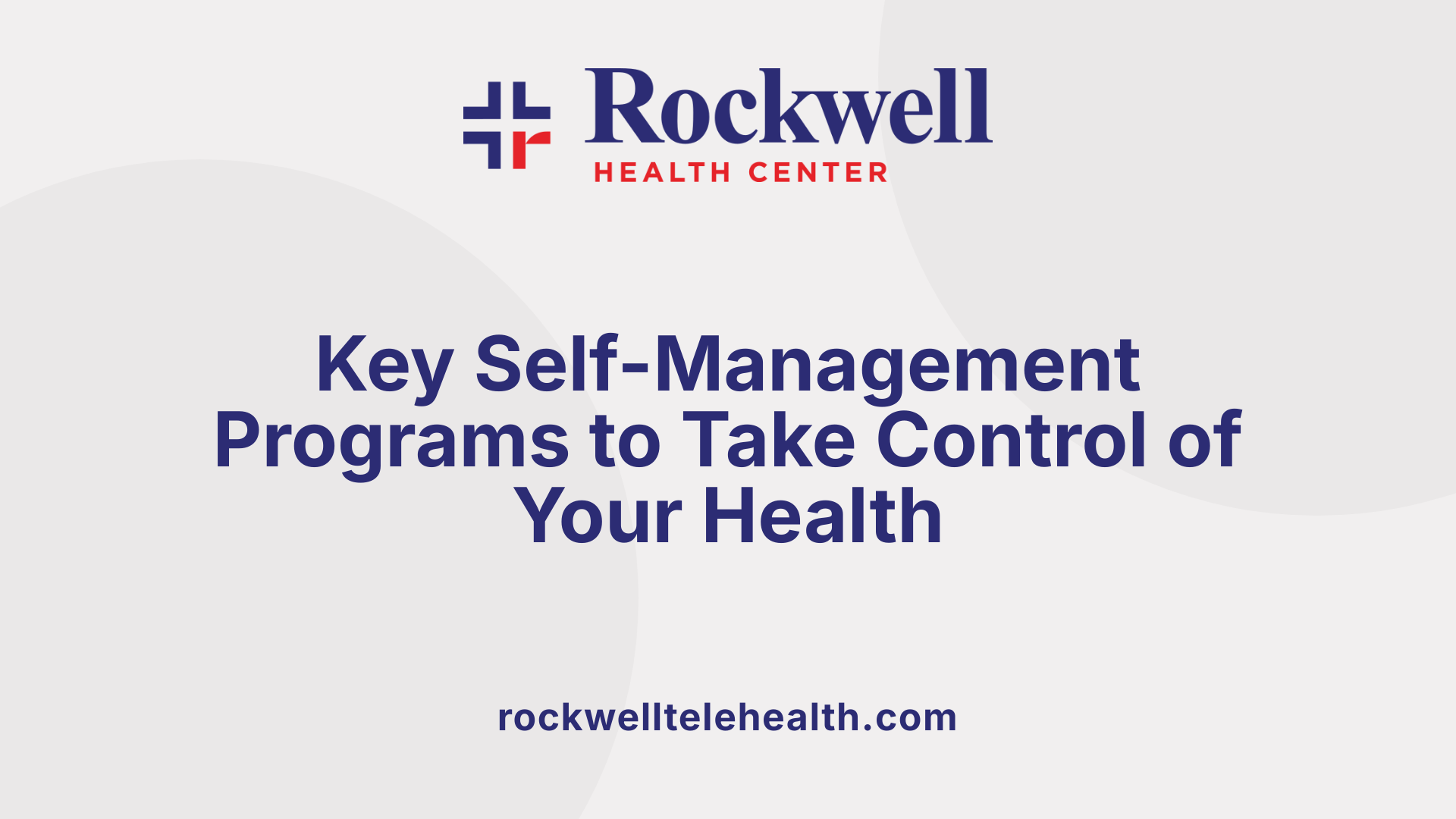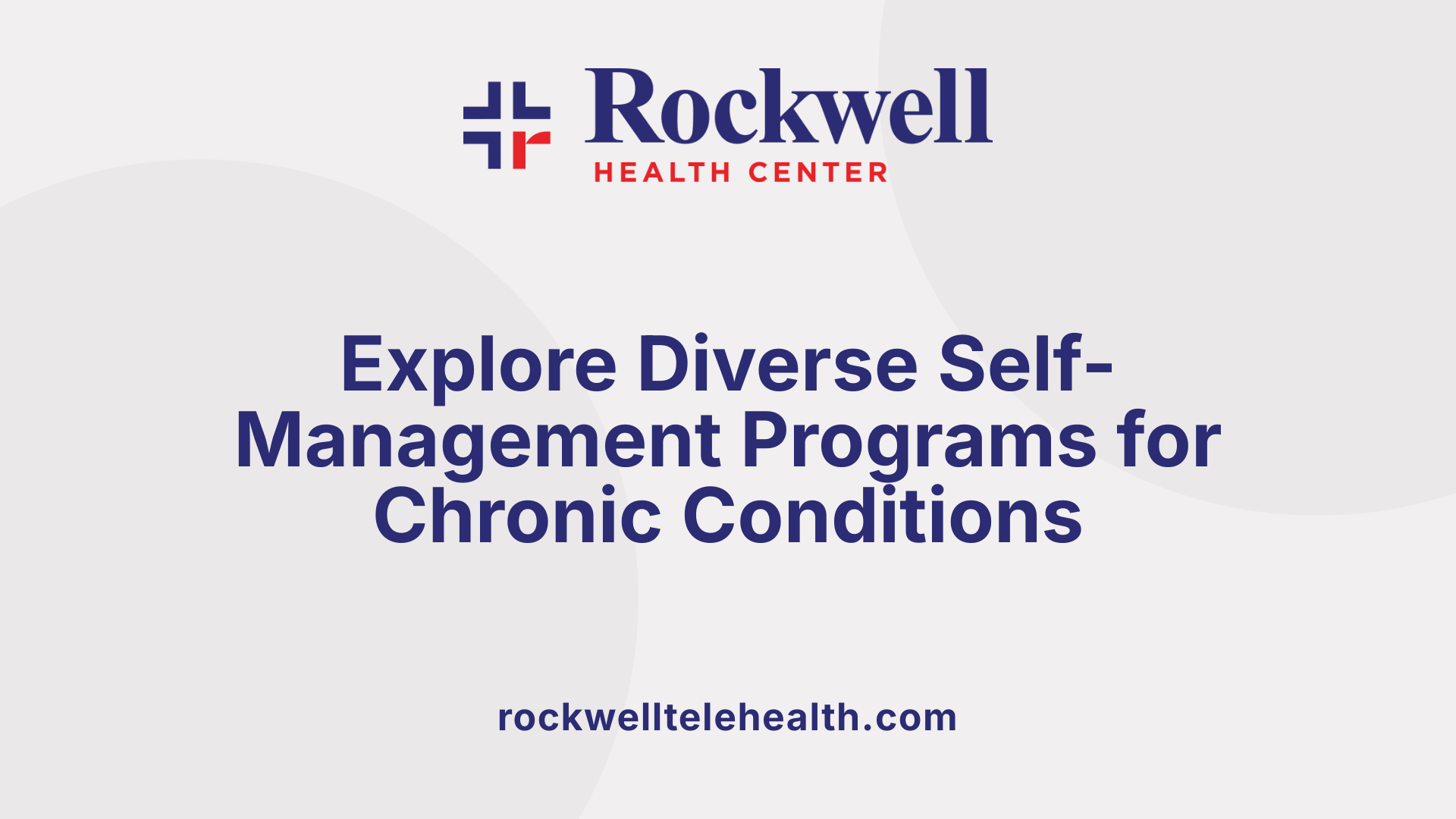Understanding Chronic Disease Management in Today's Healthcare Landscape
With six in ten adults in the United States living with at least one chronic condition such as hypertension, diabetes, or arthritis, effective management strategies are more crucial than ever. Fortunately, a variety of lifestyle-centered programs and evidence-based medical approaches are now available to help individuals tailor their health management to fit their unique lifestyles. This article explores these programs, their principles, and how they can be integrated into everyday routines to improve health outcomes and enhance quality of life.
Common Self-Management Programs for Chronic Conditions

What are some common self-management programs designed to help individuals manage chronic health conditions?
Self-management programs have become a cornerstone in helping individuals take control of their health, especially those living with chronic conditions. Among the most well-established and widely recognized are the Chronic Disease Self-Management Program (CDSMP), Diabetes Self-Management Program, and Arthritis Self-Management Program (ASMP). These initiatives are evidence-based and developed through rigorous research to ensure effectiveness.
These programs typically aim to educate participants about managing their specific health issues. They focus on important topics such as medication adherence, symptom monitoring, and lifestyle changes, including healthy eating and regular physical activity. Participants learn practical skills like problem-solving, making informed decisions, and effective communication with healthcare providers. This comprehensive approach helps to improve both physical and emotional well-being.
Delivery methods for these programs are varied to maximize accessibility. They often take place in community settings such as senior centers or clinics. With advancements in technology, many programs are now offered virtually through online platforms or via telephone, making them accessible to rural populations and individuals with mobility challenges. These flexible formats ensure that more people can participate regardless of their location or schedule.
Target populations for self-management programs include older adults, who often have multiple chronic conditions, and culturally diverse communities. Many programs are tailored to meet the unique needs of these groups, including language considerations and culturally relevant practices.
The success of these programs relies on their ability to boost self-efficacy—patients' confidence in managing their health. They foster active engagement, promote ongoing communication with healthcare providers, and encourage peer support. As a result, participants often experience better health outcomes, reduced hospitalizations, and an enhanced quality of life.
Extensive reviews of scientific studies confirm that these initiatives effectively improve health behaviors, decrease healthcare costs, and empower individuals by providing them with the knowledge and skills necessary for effective self-management.
| Program Name | Focus Areas | Delivery Formats | Target Populations | Supporting Organizations |
|---|---|---|---|---|
| CDSMP | Disease management, medication, symptom control | Community, virtual, telephone | Adults, older adults, diverse communities | Stanford University, Arthritis Foundation, Kaiser Permanente |
| Diabetes Self-Management | Blood sugar control, diet, exercise | In-person, online | People with diabetes | CDC, local health departments |
| Arthritic Self-Management | Pain management, mobility, medication use | Workshops, online | Adults with arthritis | CDC, Arthritis Foundation |
This table summarizes some of the most common programs, highlighting their main focus areas, how they're delivered, and their target audiences. These programs exemplify a broad strategy to empower individuals, reduce the burden of chronic diseases, and improve overall health outcomes.
Principles and Benefits of Lifestyle Medicine for Chronic Disease

What are the principles and benefits of lifestyle medicine approaches for managing chronic conditions?
Lifestyle medicine is an evidence-based medical specialty that focuses on treating, reversing, and preventing chronic illnesses by addressing underlying lifestyle factors. It is built around six core pillars: optimal nutrition, physical activity, restorative sleep, stress management, social connectedness, and avoidance of risky substances.
These pillars serve as the foundation for sustainable health changes that can dramatically impact chronic disease outcomes. For example, adopting a balanced diet rich in fruits, vegetables, whole grains, and lean proteins helps manage conditions like diabetes and heart disease. Regular physical activity not only supports weight management but also improves cardiovascular health and mobility.
Restorative sleep is essential for the body's repair processes and hormonal balance, whereas stress management techniques—such as mindfulness and relaxation exercises—can reduce inflammation and emotional strain. Maintaining social connections supports mental health, boosts immune function, and discourages behaviors harmful to health.
Avoiding risky substances like tobacco, excessive alcohol, and recreational drugs further minimizes health risks associated with chronic illnesses.
The benefits of lifestyle medicine extend to better health outcomes, including disease remission or reversal, and sustained improvements in quality of life. These approaches are proven to enhance physical functioning, reduce symptoms, and lower the need for medication reliance.
Additionally, lifestyle medicine significantly impacts healthcare costs by reducing hospitalizations, emergency visits, and long-term medication use. This holistic approach promotes longevity and well-being, emphasizing behavioral change as a powerful tool for health management.
Numerous research studies support these principles, highlighting the success of dietary patterns such as the Mediterranean diet and increased physical activity in reducing the risk and severity of chronic diseases. Overall, lifestyle medicine offers a comprehensive, accessible, and sustainable pathway for managing health that can be personalized to each individual's needs and circumstances.
This holistic approach aligns medical treatment with everyday behaviors, making it a practical strategy to combat the rising prevalence of chronic conditions and improve overall public health.
Integrating Health Strategies into Daily Life

How can individuals incorporate health management strategies into their daily routines for sustainable lifestyle modification?
Incorporating health management into daily routines is essential for creating sustainable lifestyle changes that improve overall well-being. The foundation of this process involves developing consistent habits that support physical, mental, and emotional health.
Establishing routines around key health activities—such as regular exercise, healthy eating, quality sleep, and stress management—helps these behaviors become second nature. For example, setting aside specific times each day for physical activity or preparing meals in advance can minimize decision fatigue and promote consistency.
Creating a structured plan for these activities can significantly enhance adherence. Planning meals with plenty of fruits, vegetables, and whole grains reduces impulsive eating choices. Scheduling workouts or stretching sessions ensures that physical activity becomes a regular part of daily life. Dedicated moments for mindfulness, meditation, or breathing exercises can assist in managing stress more effectively.
Social support also plays a vital role. Engaging friends, family, or community groups in health activities fosters accountability and motivation. Sharing goals and progress can strengthen commitment and provide encouragement during challenging times.
Self-monitoring tools like health journals, mobile apps, or connected devices help track behaviors such as blood sugar levels, blood pressure, or physical activity. Regularly reviewing these records allows individuals to identify patterns, celebrate successes, and make necessary adjustments.
Routine review and flexibility are crucial for long-term success. As lifestyle circumstances change or new health information becomes available, adapting routines ensures they remain achievable and aligned with personal health goals.
Ultimately, integrating these strategies creates a supportive environment for ongoing health management. Over time, these habits accumulate, establishing a balanced, sustainable approach to managing health and preventing chronic disease.
| Activity Type | Implementation Tips | Benefits | Additional Notes |
|---|---|---|---|
| Physical Activity | Schedule at the same time daily | Enhances cardiovascular health, mood | Start with moderate intensity exercises |
| Healthy Eating | Meal prep on weekends | Maintains balanced nutrition | Include diverse food groups |
| Sleep | Set consistent sleep and wake times | Improves mood, immune function | Avoid screens before bed |
| Stress Management | Practice daily mindfulness | Reduces anxiety, improves focus | Use guided meditation apps |
| Social Support | Join community groups or health classes | Boosts motivation, accountability | Share progress with others |
Planning and routine-setting to foster consistency
Consistency is key to successful lifestyle changes. Planning weekly menus, workout schedules, and sleep times creates a predictable structure that reduces lapses. Using digital calendars or planners can help remind individuals of their commitments. Establishing cues, such as placing workout clothes the night before or setting alarms for sleep, reinforces routines.
The importance of social support, self-monitoring, and routine review
Support from friends, family, or health professionals adds encouragement and accountability. Self-monitoring tools enable individuals to observe their behaviors and health outcomes regularly. Periodic reviews of routines allow for adjustments based on progress or changes in circumstances, ensuring these habits remain effective and sustainable.
Incorporating these elements into daily life can transform health management from a series of isolated efforts into a natural way of living. Over time, this integrated approach leads to not only better health outcomes but also a more balanced, resilient lifestyle.
Resources and Programs for Living with Chronic Diseases

What resources and educational information are available to help individuals live with chronic diseases through lifestyle modifications?
There is a wide array of resources designed to support individuals in managing chronic illnesses through lifestyle changes. Many of these are evidence-based and emphasize empowering patients to take control of their health.
Organizations such as the American College of Lifestyle Medicine (ACLM) provide comprehensive tools, clinical guidelines, and educational courses. These focus on six interconnected pillars: optimal nutrition, physical activity, stress management, restorative sleep, social connectedness, and avoiding risky substances. The ACLM also offers training programs and publishes guidelines that integrate lifestyle interventions, particularly for managing conditions like type 2 diabetes and cardiovascular disease.
Self-management education programs are central to empowering patients. Programs like Better Choices, Better Health®, and the CDC-supported Chronic Disease Self-Management Program (CDSMP) teach practical skills such as goal setting, problem-solving, medication management, healthy eating, and safe exercise.
Community-based classes, such as Walk with Ease and Arthritis Foundation Aquatic Programs, are available at local centers, helping individuals develop routines that suit their environment and lifestyle. These classes focus on safe physical activity, improving flexibility and strength, which are essential for chronic disease management.
Digital health tools and apps have revolutionized self-monitoring and engagement. Apps like MySugr assist diabetics in tracking blood sugar levels, while Heart Habit promotes heart health by encouraging physical activity and medication adherence. Online platforms offer virtual coaching, educational modules, and peer support, increasing accessibility—especially for those in rural or underserved areas.
Websites from reputable sources, including Mayo Clinic, WebMD, and CDC, provide evidence-based guidance on managing chronic conditions through lifestyle modifications. These resources encompass symptom management, nutrition advice, and lifestyle tips. Some platforms offer personalized assessments and recommendations, integrating data from connected devices.
Support groups, both online and in person, offer emotional support and shared experiences. They help reduce feelings of isolation and provide motivation to maintain healthy behaviors. Many programs and resources are offered free or at low cost, with some covered by insurance or employer plans.
In sum, individuals seeking to improve their quality of life with chronic diseases can leverage a blend of community programs, digital tools, educational platforms, and peer support—empowering them to make sustainable health-enhancing choices.
Structured and Tailored Self-Management Approaches

Can you describe various types of self-management programs and how they are structured?
Self-management programs play a vital role in helping individuals effectively control their chronic health conditions. These programs are designed to educate, train, and support participants, equipping them with the skills necessary to manage symptoms, medication, and lifestyle changes.
Many of these programs are structured around interactive workshops. An example is the Stanford University-developed Chronic Disease Self-Management Program (CDSMP). Usually lasting six weeks, these workshops meet weekly and are facilitated by trained leaders who guide participants through various topics like medication adherence, symptom relief, physical activity, and effective communication with healthcare providers.
In addition to in-person workshops, these programs often include self-study materials such as workbooks, action plans, and personalized tools. These kits enable participants to reinforce workshop learning at home and tailor management strategies to their unique needs.
Some programs are accessible online, allowing flexibility for participants. These virtual options often include weekly interactive lessons, digital tools for tracking progress, and online peer support communities.
Culturally adapted programs are also available to serve diverse populations. For example, “Tomando Control de su Salud” is a Spanish-language program tailored specifically for Hispanic communities, incorporating culturally relevant content and language.
Further, many organizations incorporate community-specific initiatives like tribal health programs or rural tele-education to reach underserved groups. These efforts emphasize customization, ensuring that educational content respects cultural practices and addresses specific health disparities.
Overall, these programs aim to boost self-efficacy by providing knowledge, skill-building, and tools necessary for sustainable health behavior change. They align with broader care models, such as the Chronic Care Model, and support ongoing engagement through follow-up and support networks.
List of Components in Self-Management Programs
| Program Type | Structure | Unique Features |
|---|---|---|
| In-person workshops | Weekly group meetings over several weeks | Facilitated by trained leaders, interactive topics |
| Self-study kits | Workbooks, action plans | Personalization of management strategies |
| Virtual programs | Online lessons, digital tools | Flexible schedule, accessible from anywhere |
| Culturally adapted programs | Language and content tailored | Addresses specific cultural needs |
| Community-specific programs | Local outreach, tele-education | Often include community engagement initiatives |
These varied formats enable widespread access and support diverse learning styles and populations. This multi-faceted approach helps ensure that regardless of background or location, individuals receive appropriate education and support to manage their health effectively.
Empowering Better Health Through Personalized Programs
Incorporating these comprehensive, evidence-based programs and lifestyle strategies into daily routines can significantly enhance individuals’ ability to manage their chronic conditions effectively. By leveraging community resources, digital tools, and tailored education, patients are better equipped to make lasting healthful changes. These approaches not only foster independence and self-efficacy but also contribute to better health outcomes, reduced healthcare costs, and an improved quality of life. Embracing a holistic, lifestyle-focused perspective is essential in today’s healthcare environment, helping individuals lead healthier, more balanced lives.
References
- Evidence-Based Chronic Disease Self-Management ...
- American College of Lifestyle Medicine | Redefining Healthcare
- Living with a Chronic Condition
- Omada Health: Manage Chronic Conditions & Embrace Your ...
- Chronic Disease Self-Management Program | SNAP-Ed - USDA
- Chronic Disease Self-Management Program (CDSMP)
- Chronic Disease Self-Management Program
























































































.png)